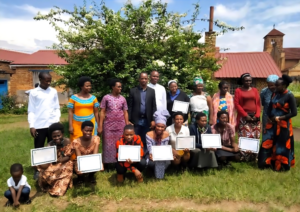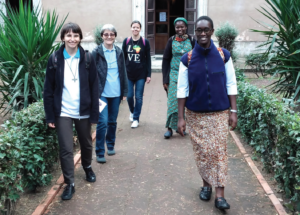From our sister Maamalifar Poreuku, Executive Co-Secretary of the JPIC Commission USG-UISG
My vocation is a childhood dream come true. Around the age of 6, some sisters called “mooda pele” often visited our village and my family. Mooda pele means “White Mothers”. I was so captivated by the name and their activities in the village that I wanted to be like them. This was what motivated me to want to go to school. When I reached the age of reason and went to school, I did not see them anymore, so I thought they had left the country. I met other congregations, but did not feel attracted to them.
After completing my secondary education, not knowing if the mooda pele were still in Ghana and not being attracted to any other congregation, I thought my dream to become a white mother was an illusion. So, thinking of other plans, I went to Tamale to see my uncle, the then Archbishop of Tamale, Archbishop Peter Poreku Dery. It was there that my friend and I met a cousin who said “What are you girls doing? The White Sisters and the Gildas Sisters want Ghanaian girls to join them.” Hearing White Sisters, without knowing they are the mooda pele, I had a very strong emotional experience that froze my body. Then, I felt something moving from the centre of my head through my whole body and went out my toes. Since I did not want anybody to know what I was thinking, I told him I was not interested in becoming a sister and I left. This happened on Sunday 24 April 1986.
From that Sunday night to the following Saturday night, there was a war of two voices in me such that I could not sleep. One voice would say, “write to the sisters” and the other would strongly oppose saying, “they would not take you because they are white and you are black.” This struggle went on for a week and I was exhausted with sleeplessness. Finally, the following Sunday I wrote to the sisters, which gave me peace. I received a response that very week, inviting me to visit. I was 24 years old at that time and was teaching in a primary school. I wanted to join immediately but Sr. Salvina Farrugia who was the vocation animator told me that I was still young and that the requirement for entry included a professional training and work experience. So, I went to Tamale Polytechnic, to did a Diploma in Business Studies, Secretariat Option from 1986-1988 and a year of National Service from 1988-1989.
In September 1989, I was told I could join. I started my Home Country experience together with Sr. Alice Bangnidong. In September 1990, we went to Nairobi for a complementary year and the first spiritual year in 1991. In July 1992, I proceeded to Zambia for the two Year-Apostolic Experience, to worked with the youth in the Parish.
When I arrived, the youth group was non-existent. I went from door to door inviting them to come to the Parish for us to work together. We did activities ranged from singing, games and reflection. We also did fund raising that enabled the youth to open a bank account and started a library. These activities were sources of motivation that kept the youth together and enable them to do things for themselves instead of waiting to receive everything from their parents. The bishop was so happy to hear that the youth have opened a bank account.
I also worked with young unmarried mothers, with whom we collected cut-off materials from different clothes’ factories, made doormats and children’s clothes. We sold what each girl made, part of the money went to each one and part to the group coffers. We got enough money to buy new materials and made new clothes for children and adults. This activity made these young mothers self-reliant, able to provide for their own needs and the needs of their child.
During my two year-apostolic experience, life was not easy such that I gave myself a dateline to leave the congregation. Before that dateline, I saw how another formee, younger than me, was suffering and I befriended her. I felt that she needed my encouragement and if I left what kind of example would I give her? Standing up for another, opened a door for me to start standing up for myself and it gave me a reason not to leave the congregation at that time.
In August 1994, I started the novitiate in Arusha, Tanzania, made my first profession on 8 September1995 and left for the United Kingdom for a year of study. I did many small courses including Development Studies in Birmingham. This course brought me in touch with my God given gift “justice issues”, which I already started in my family at a young age. I had to fight for my own education, without which I would not be here today. These studies opened me to the unjust international economy system intentionally instituted to favour the few rich and powerful at the expense of the majority. During a forum with the president of the World Bank the students questioned the unjust policy of the World Bank and IMF in the “developing world”. To defend these organisations, he gave the example that the money IMF and the World Bank lent to Ghana, has helped Ghana’s economic growth. Little did he know that there were Ghanaians in the crowd who had seen the suffering of the people. Thus, Alice and I did not hesitate to challenge him openly, and he turned red. Our lecturers and classmates congratulated us.
I was appointed Regional Superior of East Africa in 2010. Then, in the General Chapter of 2011, I was elected one of the general assistants in Rome from 2011 to 2017. I represented MSOLA at the birth of the Intercongregational Formation (ICOF) in Rome. I was also a member of the Antitrafficking and the Integrity of Creation Working Groups of the USG and UISG. I also collaborated with Talitha Kum. I learned a lot from these working groups and they were also a source of motivation for me.
All these experiences have confirmed my God given gift of justice issues, which is recognised by the people I interact with. It was the recognition of this gift in me that led me to do Masters in Peace Studies and International Relations at Hekima University College in Nairobi. During this period, I was appointed community superior. At the end of this study in 2022, the congregation asked me to come to Rome to take charge of the juniorate formation. While in Rome for this, I received my appointment as JPIC coordinator for the congregation and shortly after, as the Executive Co-Secretary of the JPIC Commission USG-UISG. So, my short journey to Rome became permanent.
I was a quiet and shy person and did not talk much when I joined the congregation. But living with people of different cultures and backgrounds, push me to come out of my shell. In my vocational journey I have experienced many discouragements, and disappointments that made me questioned if I was in the right place. However, each time, the Lord surprised me.
My earlier practical experience of dealing with justice issues was to fight for my own education, without which I would not be here today. My second experience happened during my two year-apostolic experience where I had to confront a person who was making one formee suffer in silence. I found what was happening as injustice that pushed me to do something. That action led to a change of attitude of that person toward this formee. My third practical experience was when Alice and I confronted the President of the World Bank in Birmingham. My fourth experience was when I had the courage say what I thought was injustice in the congregation and I suffered the consequences.
Logic of JPIC
JPIC has been the logic of the creator from the beginning of creation. The creation story shows that God created everything first, then human was created last (Gen 1:1-31). This logic was to ensure that humans find what they need in creation for their living and at the same time be stewards of all creation. Therefore, JPIC is at the heart of creation itself and so the mission of the Church in which all religious Congregations share, is to ensure that all creation is protected from exploitation and destruction. The purpose for this is to ensure that all find what they need for survival, mutual support and enrichment. However, we see that this logic has been thwarted by an intentional manipulative and unjust economic system that favours the rich and powerful at the expense of the majority and nature. Therefore, the importance of JPIC is a call to bring back the intrinsic logic of the creator from the beginning, which the Church calls integral ecology that expresses the interconnection of all creatures.
JPIC ROMA, is a joint Commission of the Union of Superiors General (USG) and the International Union of Superiors General (UISG). This office has two Co-presidents, one representing USG and the other UISG. It also has two executive co-secretaries, one representing USG and the other UISG. The purpose of this office is to promote and support the integration of JPIC in the life and mission of Religious Institutes. Therefore, the shared role of the two executive co-secretaries is to work with all religious congregations and together in the coordination and delivery of all the work of the JPIC Office, Individual member-congregation, according to its own charism, to achieve a greater awareness, clearer analysis and more effective action in JPIC matters for the disadvantaged within society and all creation.
I am the Executive Co-Secretary representing UISG for the JPIC Commission and the Coordinator of “Sowing Hope for the Planet (SHFP)” an initiative of UISG, supported by the Executive Council of the USG. The SHFP is a project meant to help coordinate the efforts of the Religious Sector of the “Laudato Si” Action Platform and promote the efforts of men and women religious throughout the world. Its purpose is to assist religious become aware of the needs of one another, in such a way as to determine and affirm our responses to social concerns and our interconnection with all creation.
Future if JPIC
The International Political Economy is an unjust and oppressive systemic structure that maims, destroys and kills. If we truly desire transformation for the common good, we must face this economic system head on. This economic system which influences everything has intentionally been instituted to keep the global south in poverty and misery to enable the global north to live in opulence. This premeditated structuration of the economic system is a war declared by the rich against the poor and nature, to ensure that the global north upholds its opulence lifestyle. We see this in all fronts. This is the knowledge I have gained in the peace studies and international relations, which I am ready to share with the congregation and anyone who is interested. Therefore, JPIC in our today’s world need to evolve towards systemic transformation to restore the original logic of creation for the common good. In this regard, JPIC is the conscious prayer and sacred action to transform the world in the Spirit of the Gospel through lives of justice, peace, and care for the integrity of creation. Our just ended general chapter calls us to transformation. If we truly desire to bring transformation at all levels, we need to know and understand the dynamics of the structure of the global economic system that influences everything so as to carry out our apostolates with vision and strategies to achieve transformation. I see five ways in which JPIC should focus to lead to systemic transformation at all levels.
- JPIC needs to:
- open spaces for encounter and dialogue because each of its 4 letters embraces many other issues at global, regional, national, local and personal levels.
- be like a new wind blowing that calls all people, organisations, the Church and religious congregations to integrate their charism or purpose statement in the spirit of JPIC mission and vice versa, for the transformation of the world where all creation can find their place without being threaten with extinction. Each religious congregation and their members are called to step into this new ground with boldness and courage, holding nothing back. Lay people, Christians, other religions, Faith-based organizations, national and international organizations are equally invited to do the same.
- All groups, associations and organisations both civil and faith-based must embark on collaborative ministry and networking in partnership at all levels to weave ideas, knowledge, resources, strengths, expertise etc. together like a spider’s web to make an impactful transformation in the world. As the African proverb says, “if you want to go fast go alone, if you want to go far go together.”
- JPIC must guide towards advocacy where the voices from the grassroots are brought to the places of decision-making at local, national, and international levels so that they are taken into consideration. This requires a lot of listening to the voices at the peripheries so that the appropriate actions can be taken for the good of all creation.
- JPIC is a source of inspiration meant to lead us to hear and be touched by the cry of the earth and the cry of the poor so as to envision a life of integral ecology for the common good as stewards of creation and as co-creators with God. This calls for coming up with a clear vision and strategies to make it possible.
This is where our four apostolic orientations must lead, without this, we would not be making any significant impact let alone bringing transformation.











